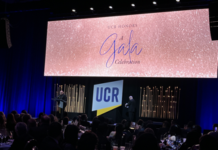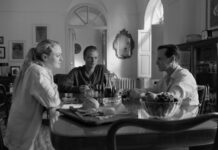
Poetry is often viewed as an esoteric form of literature. People think of passionate love letters and affectionate odes when they hear the word, and the stock image of a “poet” as a hopeless romantic clasping their hearts with endearment as they express their undying infatuation toward a person or the world.
Although the intimate mode of writing can portray appreciation like no other, poetry is also volatile. Most people do not see the other side of poetry that is vicious, aggressive and just as, if not more, powerful than a sentimental love poem.
On Thursday, Feb. 25, the UCR Chicano Student Programs held its quarterly poetry performance and open mic event, Poesia Peligrosa, in the cozy Barn theater. Poesia Peligrosa is one of the numerous events hosted by CSP that both celebrate and educate others about Chicano culture.
Most people can assume from the Spanish word “Poesia” that it is a poetry event. What some people don’t know, however, is that “Peligrosa” means “dangerous, hazardous, perilous.” The two disparate words combined form an elegant yet curious juxtaposition that many people wouldn’t understand — that is, until they hear the venomous words of the Poesia performers in front of them.
By the time the clock struck 7 p.m. on Thursday night, The Barn had already reached near-capacity. The warm, country-themed venue was packed with dozens of exhilarated poets, musicians and audience members who were anticipating both inspiration and impact. A long line to the food bar outstretched all the way to the entrance as hungry eventgoers looked forward to mouthwatering poetry with a side of fries and fruit smoothies.
Little plastic candles centered the tables and lined the stage, and with the lights dimmed to a hushed twilight, the room glowed like a sea of sultry orange flames. In the midst of the shadowy lighting, traditional mariachi music playing from the loudspeakers colored the room with trumpets and guitars.
The event officially began when enthusiastic hosts Estefania Bautista and Kellie Ramirez spiritedly welcomed the diverse crowd. Bautista described Poesia Peligrosa as a “safe space where we invite all of you to come up here and do anything you want — singing, reciting, dancing even ranting.” Bautista added an impromptu aside, “Don’t be afraid. A lot of people come up here and get inspired along the way.”
After briefly promoting the Semana de la Mujer, or “Week of the Woman,” event spanning the first week of March as well as the PODER (Providing Opportunities, Dreams, and Education in Riverside) program, the show started with a skit performed by the UCR Theatre of the Oppressed.
The skit revolved around a racist grocery store manager reprimanding a grocery store clerk for helping a Spanish-speaking customer check out her groceries. The scene ended with the grocery store clerk getting fired on the spot before a member of the Theater of the Oppressed approached the stage and classified the skit as a piece of “forum theatre.” Forum theatre, he said, aimed to teach the audience how to change the world by allowing them to stop a scenario and intervene.
In the replay scene, a brave audience member named Padi “confronted the manager by claiming that she felt “incredibly uncomfortable” with the way he spoke to his employee. She asserted that she would take her “business elsewhere” from now on as well as inform her “wide community” (referring to Indian people) to never buy from the grocery store again.
With the audience’s intuitions fully grasped by the arousing first performance, the show needed poet and professor Janine Joseph’s articulate poetry to take the angry minds away from the oppressive matter and over to the “snake holes and ant hills from St. Francis” that she spoke of in her original poem “Landscape with American Dream.” This original poem was just one of the many titles within her book, “Driving Without a License,” that she shared with the audience.
The conclusion of Joseph’s performance marked the beginning of the open mic show, which started with a highlight performance by Gabriela Bobadilla. Bobadilla recited a poem that she has established in open mic shows around the school titled “I Love Fat Women.” In a sonorous voice that could have caught someone’s attention alone, she listed the reasons why she loved fat women without once feeling ashamed of saying the label “fat,” which most people are afraid of saying so overtly. She addressed this issue with the landmark line, “I love fat women because society is taught to hate us.”
Another powerful performance was by Melissa Noriega, who addressed growing up in a city near the border where drugs were prominent. The audience played along with her swift, flowing rhythm by snapping their fingers, especially when she said, “The drugs fed you when there’s nothing to eat.” After a lengthy, thorough list of all the places she associated with drugs — “brown paper bags, sandwich bags, school lockers, top of the drawer” — she climactically ended the poem with “Power is within and not given to me by you,” referring to the discrimination that most immigrants face that prevents them from escaping poverty.
While many of the performances evidently portrayed “peligrosa” through assertion and vigor, some performances displayed a softer dimension.
Yesenia Padilla discussed how she once compared her problems to those underwent by her immigrant parents, who she said “faced real hardship” and whose spirits “remained unbroken.” At one point, she only felt guilt toward her personal difficulties in relation to those experienced by her parents. However, she eventually realized that the “glorification” of her parents’ toils caused her to “detach herself from the severity of her own problems” and that “all struggles are intertwined.”
Poesia Peligrosa innovatively presented poetry as an audacious aesthetic that induces urgency and zeal in a listener. Audience members left the event with the idea that perhaps the world needs “danger” in order to achieve the change we need.








